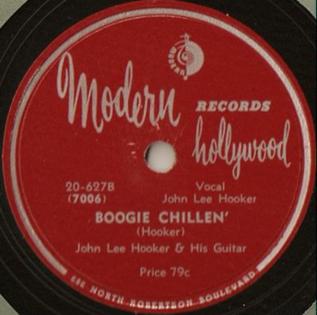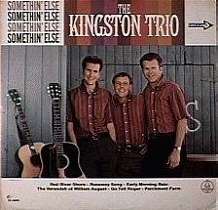
Slide guitar is a technique for playing the guitar that is often used in blues music. It involves playing a guitar while holding a hard object against the strings, creating the opportunity for glissando effects and deep vibratos that reflect characteristics of the human singing voice. It typically involves playing the guitar in the traditional position with the use of a slide fitted on one of the guitarist's fingers. The slide may be a metal or glass tube, such as the neck of a bottle. The term bottleneck was historically used to describe this type of playing. The strings are typically plucked while the slide is moved over the strings to change the pitch. The guitar may also be placed on the player's lap and played with a hand-held bar.

Edward James "Son" House Jr. was an American delta blues singer and guitarist, noted for his highly emotional style of singing and slide guitar playing.
Country blues is one of the earliest forms of blues music. The mainly solo vocal with acoustic fingerstyle guitar accompaniment developed in the rural Southern United States in the early 1900s. Artists such as Blind Lemon Jefferson (Texas), Charley Patton (Mississippi), Blind Willie McTell (Georgia) were among the first to record blues songs in the 1920s. Country blues ran parallel to urban blues, which was popular in cities.
Lester Franklin Melrose was a talent scout who was one of the first American producers of Chicago blues records.

Saunders Teddell, or Saunders Terrell, known as Sonny Terry, was an American Piedmont blues and folk musician, who was known for his energetic blues harmonica style, which frequently included vocal whoops and hollers and occasionally imitations of trains and fox hunts.

Booker T. Washington "Bukka" White was an American Delta blues guitarist and singer. Bukka is a phonetic spelling of White's first name; he was named after the African-American educator and civil rights activist Booker T. Washington.

"Boogie Chillen'" or "Boogie Chillun" is a blues song first recorded by John Lee Hooker in 1948. It is a solo performance featuring Hooker's vocal, electric guitar, and rhythmic foot stomps. The lyrics are partly autobiographical and alternate between spoken and sung verses. The song was his debut record release and in 1949, it became the first "down-home" electric blues song to reach number one in the R&B records chart.

"Fixin' to Die Blues" is a song by American blues musician Bukka White. It is performed in the Delta blues style with White's vocal and guitar accompanied by washboard rhythm. White recorded it in Chicago on May 8, 1940, for record producer Lester Melrose. The song was written just days before, along with eleven others, at Melrose's urging.

Mose John Allison Jr. was an American jazz and blues pianist, singer, and songwriter. He became notable for playing a unique mix of blues and modern jazz, both singing and playing piano. After moving to New York in 1956, he worked primarily in jazz settings, playing with jazz musicians like Stan Getz, Al Cohn, and Zoot Sims, along with producing numerous recordings.

"Baby, Please Don't Go" is a traditional blues song that was popularized by Delta blues musician Big Joe Williams in 1935. Many cover versions followed, leading to its description as "one of the most played, arranged, and rearranged pieces in blues history" by French music historian Gérard Herzhaft.

The Delta Sweete is the second studio album by American singer-songwriter Bobbie Gentry. It was released on February 5, 1968, by Capitol Records. The album was produced by Kelly Gordon.

"Dust My Broom" is a blues song originally recorded as "I Believe I'll Dust My Broom" by American blues artist Robert Johnson in 1936. It is a solo performance in the Delta blues-style with Johnson's vocal accompanied by his acoustic guitar. As with many of his songs, it is based on earlier blues songs, the earliest of which has been identified as "I Believe I'll Make a Change", recorded by the Sparks brothers as "Pinetop and Lindberg" in 1932. Johnson's guitar work features an early use of a boogie rhythm pattern, which is seen as a major innovation, as well as a repeating triplets figure.
"Take This Hammer" is a prison, logging, and railroad work song, which has the same Roud number as another song, "Nine Pound Hammer", with which it shares verses. "Swannanoa Tunnel" and "Asheville Junction" are similar. Together, this group of songs are referred to as "hammer songs" or "roll songs". Numerous bluegrass bands and singers like Scott McGill and Mississippi John Hurt also recorded commercial versions of this song, nearly all of them containing verses about the legendary spike driver, John Henry; and even when they do not, writes folklorist Kip Lornell, "one feels his strong and valorous presence in the song".

Harry Smith's Anthology of American Folk Music, Volume 4 is a two-disc compilation of twenty-eight American folk recordings originally released on 78 rpm records between 1927 and 1940, issued in May 2000 on Revenant Records, catalogue #211. Compiled by experimental filmmaker and notable eccentric Harry Smith as the fourth album of his Anthology of American Folk Music set from 1952, it was never completed by Smith himself. While the CD is out of print, an LP version has been issued, along with the other three volumes, on the Portland-based Mississippi Records label.

"Key to the Highway" is a blues standard that has been performed and recorded by several blues and other artists. Blues pianist Charlie Segar first recorded the song in 1940. Jazz Gillum and Big Bill Broonzy followed with recordings in 1940 and 1941, using an arrangement that has become the standard.

Somethin' Else is an album by the American folk music group the Kingston Trio, released in 1965. It was the first Kingston Trio principal album to miss the charts completely. The lead-off single was "Parchment Farm" b/w "Runaway Song".

"Shake Your Moneymaker" or "Shake Your Money Maker" is a song recorded by Elmore James in 1961 that has become a blues standard. Inspired by earlier songs, it has been interpreted and recorded by several blues and other artists.

The Country Blues is a seminal album released on Folkways Records in 1959, catalogue RF 1. Compiled from 78 recordings by Samuel Charters, it accompanied his book of the same name to provide examples of the music discussed. Both the book and this compilation were key documents in the American folk music revival of the 1950s and 1960s, and many of its songs would either be incorporated into new compositions by later musicians, or covered outright.

"Shake 'Em On Down" is a Delta blues song by American musician Bukka White. He recorded it in Chicago in 1937 around the beginning of his incarceration at the infamous Parchman Prison Farm in Mississippi.

"Bottle Up and Go" or "Bottle It Up and Go" is a song that is a standard of the blues. Based on earlier songs, Delta bluesman Tommy McClennan recorded "Bottle It Up and Go" in 1939. The song has been interpreted and recorded by numerous artists, sometimes using alternate titles, such as "Step It Up and Go", "Shake It Up and Go", etc.



















